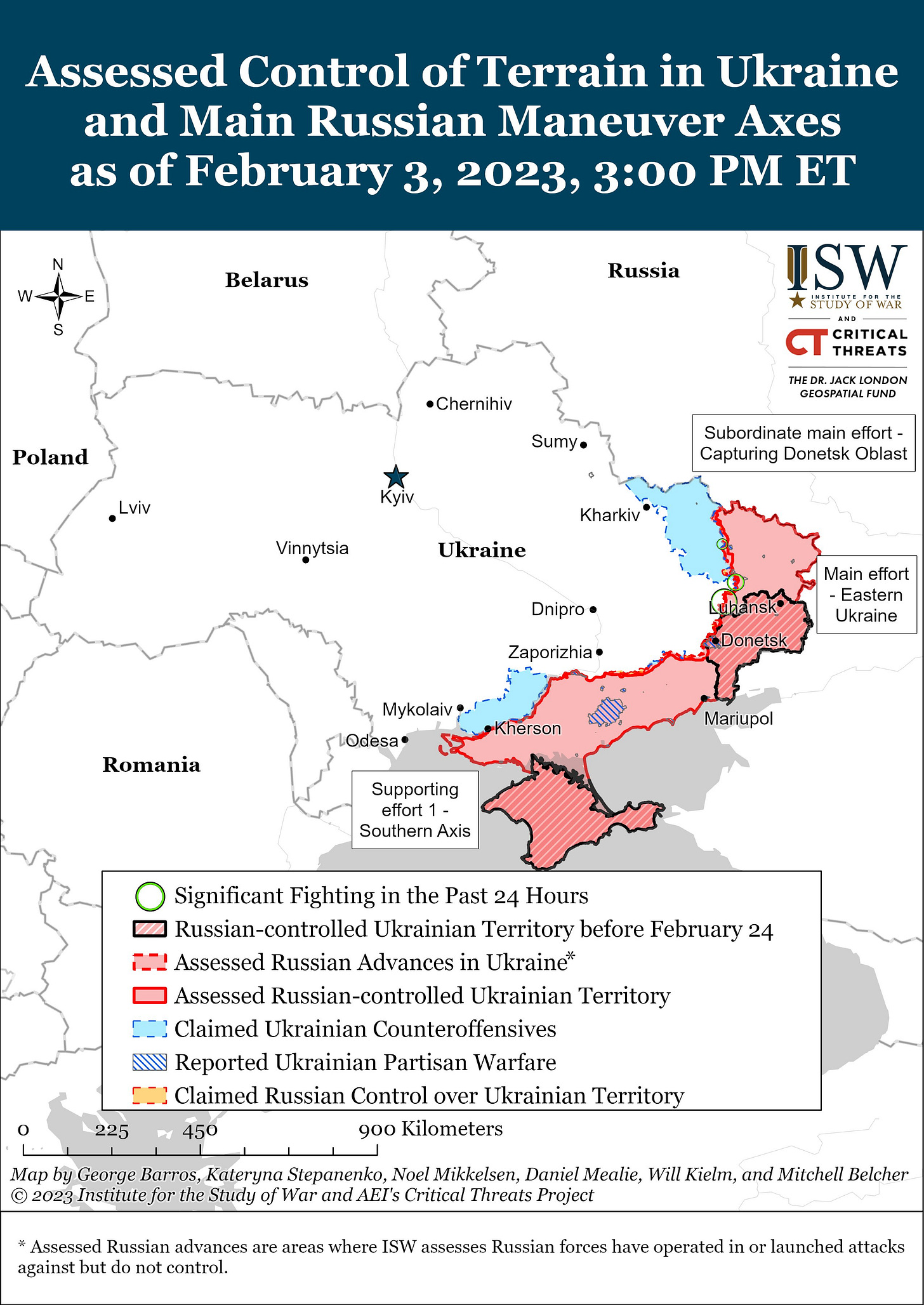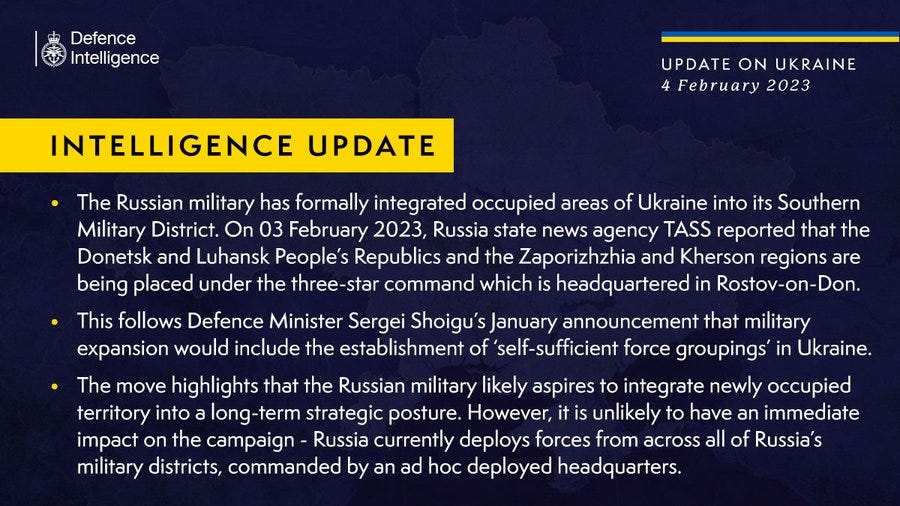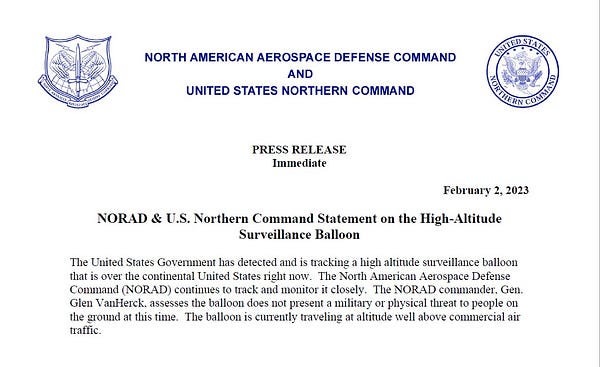Feb 4: The Saturday Edition
Day 345: UASitRep Odesa Bakhmut CarBomb Delta Mariupol China EU Portugal RUSitRep Israel A&Ps Macaes ISW Soldin UKDef Giles Vadym Sherr Sovsun YellowRibbons Grozoubinski
Catching up…
EA Worldview’s Ukraine Up-date- hop over to Scott’s amazing hourly Ukraine up-date page. I’ll fill in with some bits and bobs.
Stories we’re following…
Officials have warned repairs could take weeks after the fire at an overloaded electrical substation in Odesa on Saturday, leaving nearly 500,000 people without power. The government said it would appeal to Turkey for help and ordered the energy ministry’s stocks of high-power generators to be sent to the city.
Official: Russia ‘threw its full strength’ into encircling Bakhmut. Deputy Defense Minister Hanna Maliar said that, over the past week, Russian forces had thrown all their strength into “breaking our defense and encircling Bakhmut and launched a severe offensive near Lyman."
Border Guard: Ukrainian troops stop Russian reconnaissance group near Siversk in Donetsk Oblast. Russian forces shelled the Ukrainian defense garrison near Siversk, a city north of Bakhmut in Donetsk Oblast, overnight on Feb. 3, the State Border Guard service reported.
General Staff: Russians regroup, conduct offensives in several directions. Russian troops are regrouping and concentrating on conducting offensives in the direction of Kupiansk, Lyman, Bakhmut, Avdiivka, and Novopavlivka in Donetsk Oblast, the General Staff reported.
Car reportedly explodes in occupied Enerhodar, killing collaborator. A car owned by a collaborator exploded in the Russian-occupied city of Enerhodar in Zaporizhzhia Oblast on the morning of Feb. 3, according to Ivan Fedorov, acting mayor of Melitopol, located in the same region and also occupied by Russian troops.
Ukraine to introduce Delta situational awareness system for military. The government officially green-lighted the implementation of Delta, the first Ukrainian military-tech situational awareness system developed in accordance with NATO standards.
Official: Nearly 30,000 Russian soldiers in and around Mariupol. Petro Andriushchenko, an advisor to the mayor of Mariupol, reports that within the past week, the number of Russian soldiers around the city increased by 10,000-15,000. Most of them are stationed in the villages in the Mariupol district, Andriushchenko said.
UK Defense Ministry: Russian Wagner Group's supply of convicts for war in Ukraine 'significantly reduced.' "Significant tensions between Wagner and the Russian Ministry of Defense are playing out in public; competition between factions in the Russian elite is likely to be partially responsible for the reduced supply of convicts," reads the ministry's latest intelligence update.
ISW: Russia continues to portray war in Ukraine as direct threat to its own security. The Institute for the Study of War said in its latest update that Russian officials continue to perpetuate the information operation that the war in Ukraine is a direct threat to Russian security through legislative manipulations.
Russian dairy producers have begun labeling containers of milk by their mass rather than by their volume (probably to obscure that less milk is being sold per box as prices rise)
Russia’s Higher Education Ministry is preparing new “patriotic” history course for non-history majors (the curriculum reportedly emphasizes how “a strong central government” has safeguarded Russia’s statehood throughout history)
Russians set 5-year record in 2022 in number of visits to Armenia, Kyrgyzstan, Uzbekistan, Tajikistan, and Mongolia (4.7 million more trips than the number of visits to the same countries in 2021)
German top official says no evidence of Russian sabotage of Nord Stream pipeline. German investigators currently have no evidence that Russia is behind the explosions on the Nord Stream 1 and 2 gas pipelines, German Attorney General Peter Frank told Die Welt.

Ukraine opens criminal case against Wagner Group founder Evgeny Prigozhin (the charges are encroaching on Ukraine’s territorial integrity and waging a war of aggression)
U.S. prosecutors may confiscate $5.4 million belonging to sanctioned Russian businessman Konstantin Malofeyev, a judge ruled on Thursday, paving the way for the funds to potentially be used to help rebuild war-ravaged Ukraine. Reuters
US allocates $5.4 million confiscated from Russian oligarch to help rebuild Ukraine. Prosecutor General Andriy Kostin reported on Feb. 3 that the U.S. had authorized “the first-ever transfer of the confiscated assets in the amount of $5.4 million for rebuilding Ukraine.”


Charles Michel: Ukraine will become EU member despite Kremlin’s threats. Charles Michel, the president of the European Council, said on Feb. 3 that Ukraine would become a member of the European Union despite the Kremlin's threats. Ukraine officially received EU candidate status in June 2022 but talks on its accession have not begun yet.
EU will work to allocate 1 billion euros for Ukraine’s reconstruction. Following the Ukraine-EU summit held on Feb. 3 in Kyiv, European Commission President Ursula von der Leyen announced the working towards a 1 billion euro contribution to Ukraine for the restoration of infrastructure destroyed by Russia.
EU provides Ukraine with ambulances, new off-road trucks for military. Following the Ukraine-EU summit held on Feb. 3 in Kyiv, the EU Foreign Policy Chief Josep Borrell reported that 94 off-road trucks, 50 ambulances, and 13 new off-road military transport vehicles had already arrived in Ukraine under the European Peace Facility (EPF).

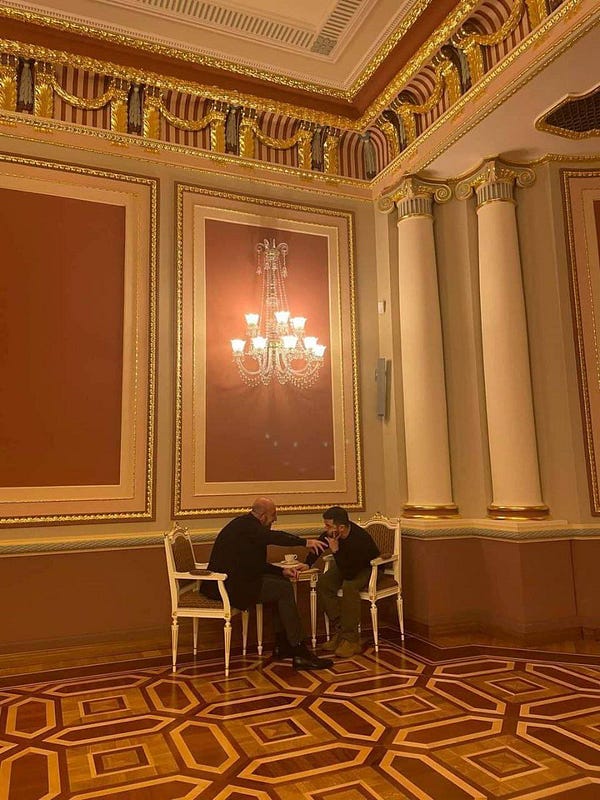
CNN: US, allies announce new price cap on Russian oil products. Additional sanctions were announced on Feb. 3 as the U.S., the G7, the European Union and Australia placed a price cap on “seaborne Russian-origin petroleum products,” the U.S. Department of Treasury said.
Israeli PM Netanyahu ordered the government to reconsider a new military aid policy for Ukraine. Some officials estimate that no significant policy change is expected but according to 3 senior officials, Israel could provide defensive weapon systems.
Bloomberg: Germany, Sweden in talks on giving surface-to-air missiles to Ukraine. Germany and Sweden are in talks over a new arms package, under which Stockholm would provide Ukraine with surface-to-air missiles and launchers for the German IRIS-T air defense systems, Bloomberg reported on Feb. 3, citing people familiar with the matter.
Germany approves delivery of older Leopard 1 tanks to Ukraine in addition to Leopard 2s. The German government had previously also approved the delivery of more modern Leopard 2 tanks to Ukraine.
Portugal has become the latest country to say it will send Leopard 2 tanks to Ukraine, Prime Minister António Costa said on Saturday. Costa said Portugal was in talks with Germany to obtain parts needed for the repair of unusable Leopard tanks in Portugal’s armed forces. He did not say how many would be sent.
Lithuanians donate 1 million euros in an hour to buy radar for Ukraine. Lithuanians on Feb. 3 donated over 1 million euros during just one hour to purchase multifunctional tactical radar systems for Ukraine as part of the Radarom! fundraising campaign, Andrius Tapinas, the founder of Lithuania's Laisves TV, said on Facebook.
As per John Foley:
U.S. Department of State, Critical New U.S. Security Assistance to Ukraine
The United States is announcing today two new security assistance packages to help Ukraine continue to defend itself against Russia’s brutal war. These packages include critical air defense and counter-drone capabilities to help Ukraine defend its people, as well as armored infantry vehicles and more equipment that Ukraine is using so effectively, including Javelin anti-tank missiles, artillery ammunition, and conventional and long-range rockets for U.S.-provided HIMARS.
Pursuant to a delegation of authority from the President, I am authorizing our 31st drawdown of U.S. arms and equipment for Ukraine since August 2021, valued at $425 million. In addition, the U.S. Department of Defense will be committing another $1.75 billion in support for Ukraine under the Ukraine Security Assistance Initiative to help strengthen Ukraine’s military.


Sherr & Gretskiy, Why Russia Went to War: A Three-Dimensional Perspective- ICDS
Since Ukraine’s independence became a recognised fact in 1991, the spectre of war with Russia has arisen on several occasions, only to subside. To many outsiders, the war of 2014 was a ‘hybrid war’ launched by ‘separatists backed by Russia’, rather than a fully-fledged war, and the ‘Minsk process’ was defusing it. Until the United States presented details of Russian war plans at the end of 2021, very few observers expected Russia to transgress the bounds of coercive intimidation in its dealings with Ukraine. Once war broke out in February 2022, the pervasive question was ‘why?’
In this analysis, the authors seek to answer that question. First, they set out the distinctive but overlapping factors that shape Russia’s outlook: geopolitics, civilisational identity and internal governance. These alone show why the threat of war has been implicit in the character of Russia’s relationship with Ukraine: why, to the Russian mind, Ukraine’s independence is an aberration, why the West’s presence there is viewed in hostile terms and why Russia demands that it be the sole arbiter of what Ukraine’s independence means in practice.


Franz-Stefan Gady, Anatomy of a Russian Army village assault- Wavellroom
At the end of December 2022 a set of discarded Russian Army orders found near the village of Kyselivka in Kherson Oblast was passed to the editor-in-chief of Ukrainian journal Censor.net Yurii Butusov. They related to an assault on the village of Blahodatne on 15 August. Kyselivka is roughly 20 kilometres north-west of Kherson City centre and is the gateway to the city on the M-14. Blahodatne is another five kilometres further on and was the frontline settlement during the Russian occupation of the Dnipro right bank. The Ukrainian unit defending in this area was 18 Battalion, 35th Marine Brigade. The orders pertained to an assault company from 108th Guards Air Assault Regiment.
The orders and action offer valuable insights into limitations and problems facing the Russian Army. This article considers the orders and the attack and discusses what it means.
The fire plan
The salient observation on the fire plan is that it belongs to the early 20th century. There is no direct relation (an artillery officer or party) between the assaulting unit and the units allocated to provide the offensive support (in Russian terms the rocket and artillery fires). The latter are controlled at divisional level and provide the fires for but not with the assaulting unit. It is entirely possible for the assaulting unit not to have visibility of the fire plan other than the timings shown in the orders (which may contribute to fratricidal incidents).
In WWI-style (and in the practice of the Red Army in WW2), a lengthy bombardment is laid on for the assaulting unit, in this case lasting all day. At the conclusion of the fire plan the unit assaults. It has no further call on artillery or rocket fires.
The fire plan is indiscriminate. As witnessed in many scores of villages across Ukraine, the aim is to level the settlement and force the defenders to leave (because ‘there is nothing left to defend’ as a weary defender of Popasna in the Donbass remarked; this settlement, incidentally, pre-war home to 20,000 residents, has been completely erased from the map and will not be rebuilt).

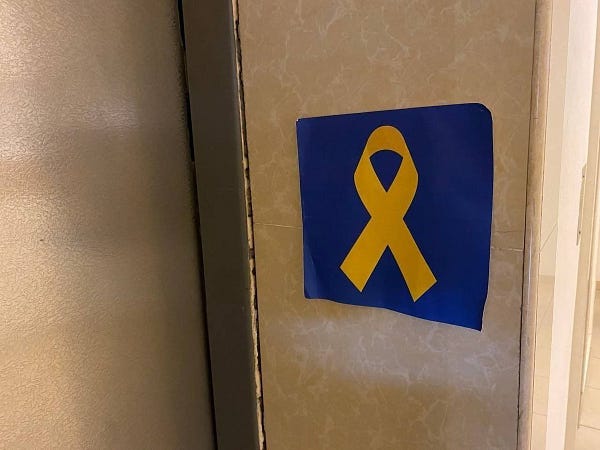
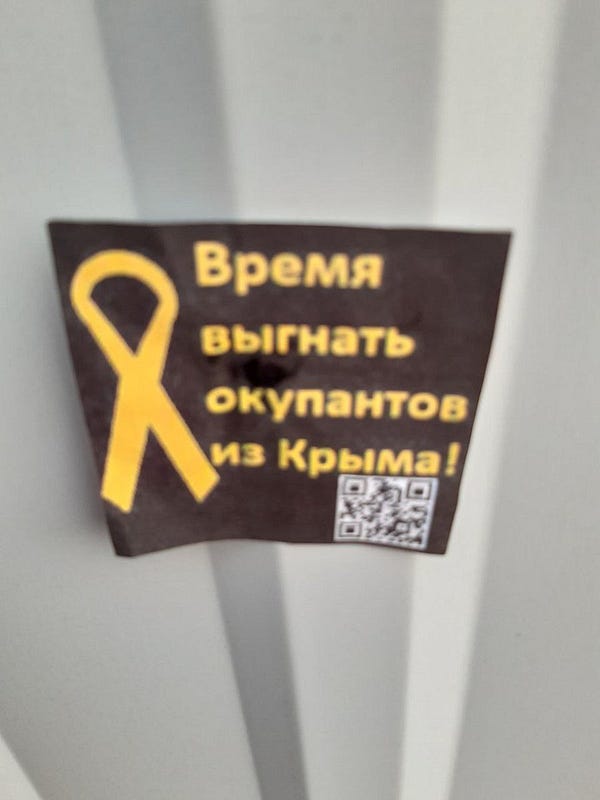


Programming Note…







